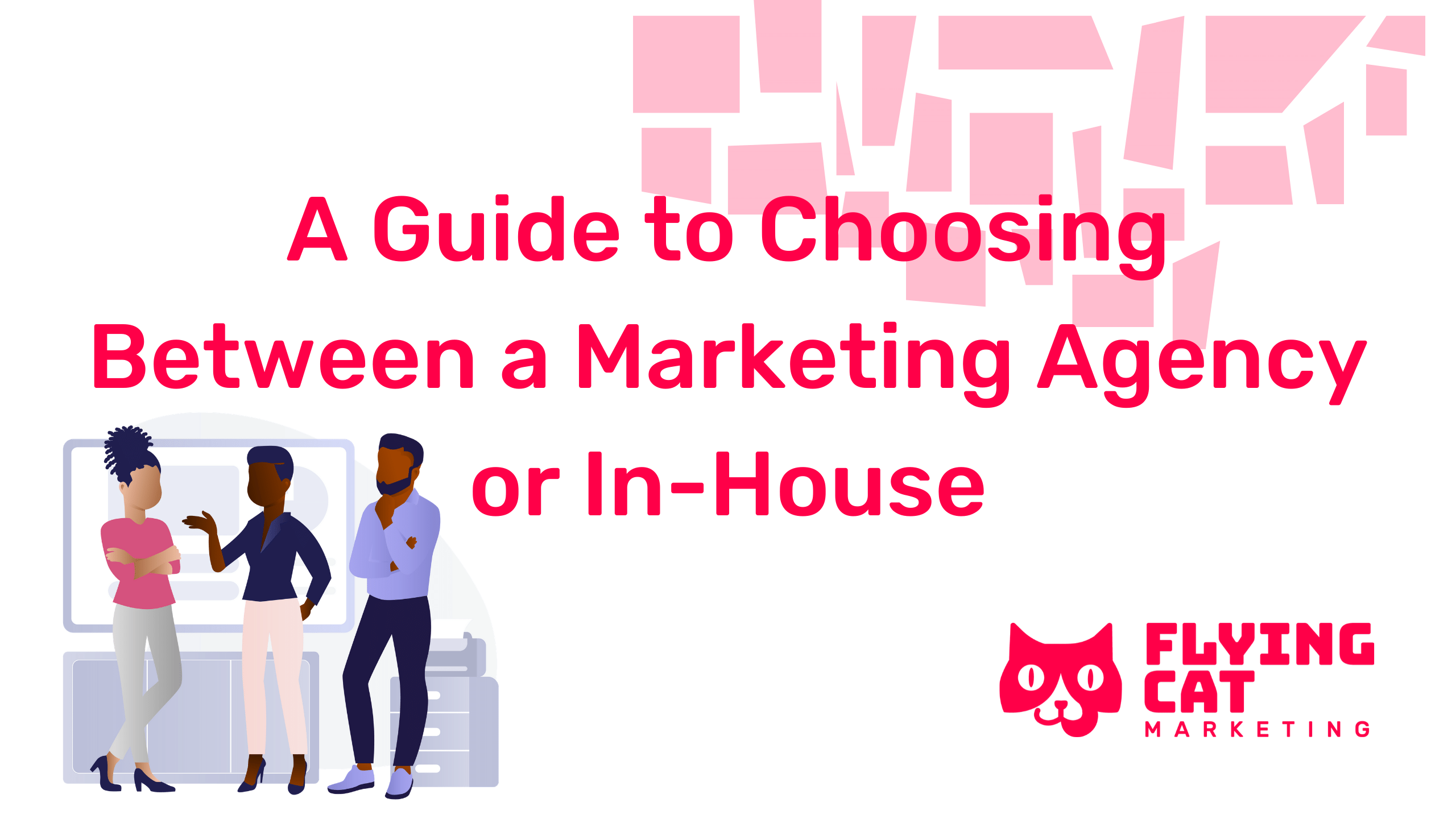Content marketing agency or in-house team?
Most startup founders who want to start content marketing struggle with the same challenges:
- Which choice will provide the most value?
- How much can I do with the team I already have?
- Can I get results on my own?
- How much should I invest for expert input?
The answer depends on many aspects of your business – its size, budget, goals, industry, and many other factors.
This article has one goal:
To help you make the best choice for YOUR specific startup.
We’ll break down the advantages of each based on your goals, startup stage and budget.
How?
- Covering every important consideration.
- Using real figures.
- Breaking down the time needed for an effective strategy
- Comparing pros and cons of each
You’ll have a clear picture of the benefits and downsides of each option – and in the ideal scenario, you’ll know what option is better for your business and why.
So, hire or outsource? – Let’s break it down.
Before you go on: if your startup doesn’t have product-market fit yet, just do it in-house. It will be far too expensive to work with an agency if you keep pivoting and don’t have a clear goal. If you have product-market fit, read on.

Content marketing agency vs. in-house team for startups
Let’s take a quick look at the main considerations of each option.
Marketing agency = ready-to-use, complete marketing solution
Marketing agencies connect your brand with a wider variety of specialized professionals. They give you access to strategists, designers, managers, and the elements that an effective marketing strategy needs.
In-house team = specialized attention and 100% dedication
Some startups choose to hire in-house to:
- Have full-time acess to someone.
- Get the full attention of their team.
- Leverage flexibility for early stage pivoting.
- Build a company culture.
In-house teams offer a more personalized experience than large agencies dealing with many clients. They’re fully dedicated to your brand.
Boutique agencies are very different to corporate agencies
There are different types of agencies you can outsource.
A large, corporate agency has different pros and cons to a small, boutique agency.
There are often too many people working on your project. It gets inconsistent, and the agency focuses on churning out content rather than building your brand.
The nice in-between is a high-touch, boutique agency:
A personalized, specialist experience, which provides more expert value than a marketing manager wearing too many hats.
Here are some factors to consider when deciding who will handle your marketing:
We created a guide to interviewing customers for content that resonates with them
CREATE CONTENT FOR GROWTH
Cost of an agency vs. in-house
Let’s keep it simple.
You will get significantly more value and assets with a marketing agency.
Depending on what you need, an agency costs from $1k to $10k per month. Some more.
That’s with a team of experts handling your content at scale. A single full-time marketing manager will cost an average of $5,400/month in the US.
Typically, a marketing manager at a small company will do everything:
Strategize, manage freelancers, manage affiliates, write content, keyword research, social media, paid social…
They’re sometimes even handling leads.
They’re dedicated to your company but, wearing too many hats, the to-do list gets long and results are slow.
A minimal content marketing strategy that grows your business looks like this:
|
Task |
minimum time for quality work |
|---|---|
|
Customer interviews & research, optimizing the avatar |
10 hours/month |
|
Keyword research & content strategy |
12 hours/month |
|
Creating 4 high-quality SEO-optimized articles. (Including minor graphics, fact-checking, revision, and research of competing articles.) |
50 hours/month |
|
Link building |
48 hours/month |
|
Content repurposing for various channels |
40 hours/month |
|
Content distribution |
40 hours/month |
|
Content re-optimizing |
8 hours/month |
|
Analyzing results, reporting, restrategizing |
5 hours/month |
|
Total |
213 hours/month |
This is at the smallest scale of effective operation.
This is assuming the person knows what to do. If they don’t, this will take long and have a higher learning curve before results come in.
According to Glassdoor, the cost of doing this in-house is:
- Marketing Manager – $81,078/year
- Graphic Designer – $48,561/year
- Web Designer – $57,470/year
- Copywriter – $60,296/year
- Social Media Manager – $55,199/year
Running a business’ entire marketing efforts effectively usually requires many specialists.
An agency gives you access to the collective knowledge base of all its specialists. This includes designers, writers, marketing managers, and more.
All for nearly the same cost as one in-house employee.
The money and hours you save by choosing an agency can be used on working spend. This gives your brand a higher budget for content creation and more room to play with paid ad campaigns.
Marketing agencies have a shorter learning curve
Marketing agencies are much more accessible and easy to get started with.

They pay for their own software, equipment, talent acquisition, and training. All these up-front expenses skyrocket the initial investment for an in-house team.
In-house teams have a huge barrier to entry. There’s no shortcut – you need to pay all the up-front costs to get started.
To make matters worse, if newly-recruited, in-house employees don’t fit the role, you’ll have to re-invest in recruiting and training again.
Agencies are on the other end of the spectrum.
Their low barrier to entry lets you temporarily cut your relationship to lower costs for a period of time.
It’s also easy to upgrade or downgrade your assets from month to month. In-house, you need to deal with the hassle of hiring and firing.
There’s a large value difference between content marketing agencies vs. in-house teams.
Some questions to ask yourself when making this decision:
✅ Would I rather my marketing manager focus on things other than creating content?
✅ Do I see content as a commodity or a valuable asset to growing my business and brand? Do I want to invest in it?
✅ Are my goals clear enough to outsource? Or would I rather have someone that is more flexible?
✅ Do I understand content marketing enough to train my staff? Or would it be easier to outsource it to a team of experts?
✅ Can my team and I set aside all the time mentioned above to launch an effective content strategy?
✅ What are the greatest skills in my team? Where would they provide the most value to my business?
Marketing agencies pros:
- Lower barrier to entry: Low or non-existent set-up costs to get started. You sign the contract and begin right away.
- Lower cost for a team: No employee contributions, benefits, no training, and an entire team of experts.
- More value from your own team: Outsourcing tasks frees them up to focus on what brings the most value.
Marketing agencies cons:
- Not in the office: They’re not part of your daily huddles. They don’t immerse themselves in your company culture as much as an employee.
- Hard to choose the right one: Some jack-of-all-trade agencies might hurt your brand more than help it. It’s difficult to find one that is fully aligned with your brand values.
- An investment: They are an extra investment, especially if you already have the employees you would use. If your goals aren’t clear, it might not be time to invest in an agency yet.
In-house team pros:
- On your terms: Marketing agencies have rules and standardized procedures. In-house, your investment works on your terms.
In-house team cons
- Typically more expensive overall.
- Higher barier to entry: Much higher up-front costs to recruit and train employees.
Skills and expertise
One of the main reasons startups choose agencies is their skills and expertise.
Agencies generally have a broader variety of skill sets than in-house teams. They have multiple specialists with different abilities that you can tap into.
A few employees are unlikely to have a deep understanding of ALL aspects of marketing.
What if there are “holes” in their marketing expertise?
Nobody else with the required skills will be there to take over when something is out of their capacity. That is, unless you have a large, varied marketing team.
Marketing agencies have encountered these issues before. And they have standardized protocols for solving them.
As for the strong points of in-house teams:
They have a close relationship with the brand that agencies have a hard time rivaling. They are physically present and can get a feel for the human side of their coworkers and superiors.
They are more in tune with the company’s values, goals, and industry. Their big and only responsibility is the brand.
In-house employees dedicate their lives to a single industry. This helps them develop key skills that are very specific and relevant to the business.
The value that in-house teams provide is dedication to growing only your brand. There is a learning curve, but they’re doing it for you.
Boutique agencies – although not to the same degree – are similar to in-house teams in this sense. They have small teams and only take on a handful of clients at a time to ensure a personalized experience.
Marketing agency pros:
- Broader variety of skill sets and expertise.
- Huge knowledge base and more brains to tap into.
- Higher expertise: An agency gives you a team: an SEO specialist, a copywriter, a designer – nobody gets burnt out and quality stays high.
Marketing agency cons:
- Not as close a relationship with your brand.
- Less understanding of brand goals and values.
In-house team pros:
- Closer relationship with the brand and its members.
- Better understanding of brand values, goals, and industry.
- Great at acquiring and developing brand and industry-specific skills.
- Better understanding of brand technicalities and minute details.
In-house team cons:
- Fewer members > fewer skill sets to choose from.
- Fewer specialists for each facet of marketing.
- Less likely to be prepared for a situation or problem.
- Wearing too many hats, unable to focus on one thing, effort gets worn thin.

Flexibility
Agencies have more skill sets and are a more cost-effective expert team. In-house teams are more dedicated to the brand.
But, which one is more flexible to your needs?
Which one will be able to change the course of its operations at the drop of a hat?
Which alternative has fewer “rules” and gives you more wiggle-room to change the “who and how” of every task?
Let’s start with the obvious. In-house employees are physically present and fully dedicated to your brand. In terms of flexibility, this means that….
…you can do with them as you please.
Suddenly want them to prioritize a certain task the whole eight working hours to get it done quickly?
Done.
Want to change who’s in charge of a certain task? Or want multiple members to work together so they learn from each other?
Done.
You get the point. Employees are in-house and it takes no longer than a few seconds to change how they’re operating.
You can tell your entire team to brainstorm ideas, work in pairs, or anything you want, at ANY time. In-house flexibility is at the opposite side of corporate agency flexibility – the possibilities are endless.
Corporate agencies, on the other side of the spectrum…
They typically have 100s of simultaneous clients and 500+ employees. These large, complex operations have many layers of stakeholders and contact points with the client.
There is less room for “exceptions” and special requests.
Boutique agencies are a different ballgame. They have fewer clients and projects to deal with, and their operations are simple enough to make room for exceptions and sudden requests.
They’re also small enough to let you speak directly with the CEO.
Easy access to decision-makers makes it easy to request special deals or atypical projects.
But don’t conclude that in-house is always more flexible. Agencies can be more flexible sometimes.
For example, if you only have one or two in-house employees, it’s going to be difficult to speed up a task dramatically.
Some agencies will allow you to pay an extra fee to allocate the resources and employees to speed things up.
And like I said in the “cost” section, agencies have more cost flexibility.
Marketing agencies pros:
- More cost flexibility.
- Boutique agencies can be very flexible.
Marketing agencies cons:
- More rules and limits: Agencies – especially large ones – have a lot of clients and projects. They need strict schedules and limits to work efficiently.
- Less room for exceptions and special requests.
In-house team pros:
- Outstanding operations flexibility: You can decide exactly how employees operate at ANY time.
- Larger in-house teams have outstanding flexibility.
In-house team cons:
- Bad cost flexibility.
- Small teams are less flexible in some ways.
Communication
Efficient communication is a huge part of project execution. It’s a prerequisite to keep things running smoothly and effectively.
When communication is slow, individual tasks or even entire projects have to be put on hold. It’s inefficient. There’s nothing more frustrating than having to stop what you’re doing because replies take ages.
When communication is not complete or accurate, projects move in the wrong direction. Your plan – somehow – doesn’t go as planned.
Communication is effortless with an in-house team. There’s no doubt that in-house is the winner here. It’s fast, easy, and effective.
Agencies are not as accessible. They’re often busy with other clients, and you may need to wait a little while to get a reply. On the other hand, agencies have systems and processes that make sure everything gets done as planned.
If you need quick replies, many agencies will provide you a phone number to call when you need them.
So, unless your business requires extremely quick and constant replies, an agency should work just fine.
It all depends on your particular needs.
Marketing agencies cons:
- Longer reply times.
- If hiring overseas, differences in time zones can be bothersome.
In-house team pros:
- Effortless and effective communication.
- Immediate replies.
- Easy to brainstorm, make group discussions, and anything that requires communication.
- Same time zone.
Why to consider outsourcing your content marketing
When choosing between a marketing agency and an in-house team, there isn’t a single right choice. The best option depends on nothing else other than your individual startup’s needs.
Also, don’t forget that you can pick both at the same time. Countless marketing agencies deploy both to achieve a greater balance between both options.
Do you have product-market fit, clear goals, and want an expert team to accelerate your brand with content? Let’s chat and see if we’d be a good fit.
